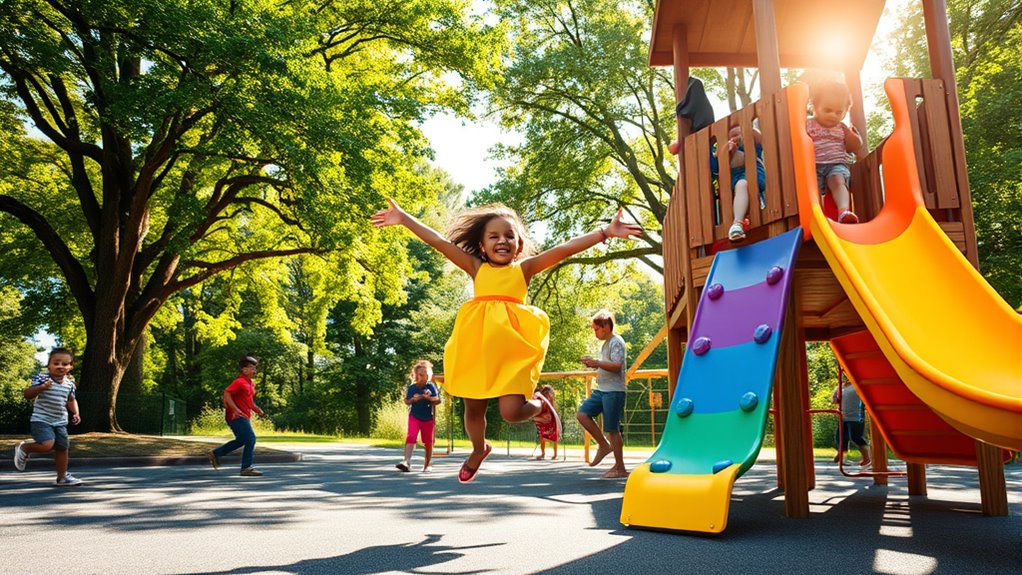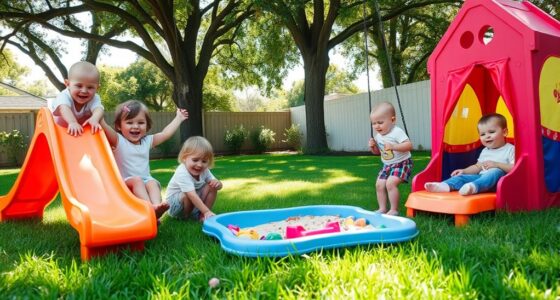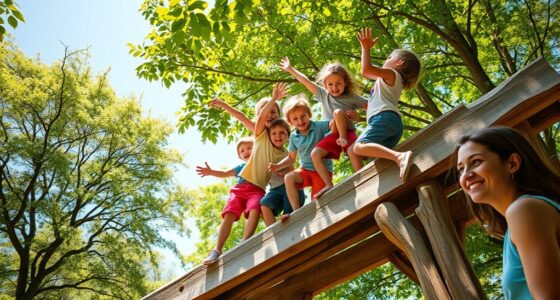Outdoor play is essential for healthy child development because it boosts physical health, improves coordination, and builds strength through activities like running and climbing. It also sparks curiosity, encourages problem-solving, and enhances cognitive skills by exploring nature. Socially, children learn cooperation, sharing, and teamwork with peers. Emotional growth is supported as outdoor time reduces stress and fosters independence. Keep exploring, and you’ll discover even more ways outdoor play helps children thrive.
Key Takeaways
- Promotes physical health by improving strength, coordination, and cardiovascular fitness through active outdoor activities.
- Stimulates cognitive development by encouraging exploration, observation, and problem-solving in natural environments.
- Enhances social skills through cooperative play, sharing, and teamwork with peers outdoors.
- Supports emotional well-being by reducing stress, boosting mood, and fostering confidence and resilience.
- Fosters a lifelong appreciation for nature, curiosity, and environmental awareness essential for holistic growth.

Outdoor play plays an essential role in a child’s development, offering opportunities for physical, social, and cognitive growth. When you encourage your child to spend time outside, you’re giving them the chance to explore nature and engage in physical activity that’s indispensable for their overall health. Nature exploration sparks curiosity and helps your child develop a sense of wonder about the world around them. As they climb trees, dig in the dirt, or chase butterflies, they learn about their environment firsthand. These activities stimulate their senses and boost their understanding of nature, fostering a lifelong appreciation for the outdoors.
Outdoor play nurtures curiosity, sensory development, and a lifelong appreciation for nature through active exploration and discovery.
Physical activity is a cornerstone of healthy growth, and outdoor environments are perfect for it. When your child runs, jumps, or bikes outside, they build strength, improve coordination, and enhance their motor skills. These movements also promote cardiovascular health and help maintain a healthy weight. The variety of terrains and natural obstacles encourage problem-solving and agility, providing more dynamic exercise than indoor play. Plus, being active outdoors can boost your child’s energy levels and mood, reducing feelings of stress or anxiety. It’s not just good for their body; it’s equally beneficial for their mental well-being.
Beyond the physical benefits, outdoor play supports social development. When your child interacts with peers during outdoor activities, they learn important social skills such as sharing, negotiating, and teamwork. They experience the joy of cooperative play, which helps build confidence and resilience. Nature provides a peaceful backdrop for unstructured play, fostering creativity and independence. As they navigate their outdoor surroundings, they learn to make decisions, take risks, and solve problems—all critical skills for their growth.
Furthermore, outdoor play enhances cognitive development. Nature exploration encourages experimentation and discovery, which sharpens your child’s observation and critical thinking skills. They might identify different plants or animals, ask questions about how things work, or invent games based on their surroundings. These experiences stimulate their imagination and curiosity, laying a foundation for lifelong learning. Additionally, incorporating outdoor play with engaging equipment such as projectors or screens in outdoor spaces can further enrich their sensory experiences and learning opportunities.
In essence, outdoor play isn’t just about fun—it’s an indispensable aspect of healthy child development. By giving your child ample opportunities to explore nature and engage in physical activity, you’re helping them grow into healthy, curious, and confident individuals. The natural environment acts as a rich classroom, offering endless opportunities for learning and growth in a way that no indoor setting can replicate.
Frequently Asked Questions
How Does Outdoor Play Influence Emotional Regulation in Children?
Outdoor play helps children develop emotional regulation by boosting emotional resilience and improving stress management. When you let kids explore nature and engage in active play, they learn to handle challenges and control their emotions better. This outdoor environment encourages them to practice patience, adapt to changes, and build confidence. As a result, your child becomes more resilient emotionally and learns healthier ways to manage stress over time.
What Safety Precautions Are Recommended for Outdoor Activities?
Imagine a child riding a bike at the park. To keep them safe, you should guarantee supervised play and that they wear protective gear like helmets and knee pads. Always check the equipment and play area for hazards, and stay nearby to monitor their activity. These precautions help prevent injuries and promote a fun, safe outdoor experience, giving both you and your child peace of mind during playtime.
Can Outdoor Play Reduce Childhood Anxiety and Depression?
You can help reduce childhood anxiety and depression by encouraging outdoor play, which fosters a strong connection with nature. This exposure boosts mood and reduces stress. As kids explore, they engage in risk-taking behavior that builds confidence and resilience. By providing safe outdoor environments, you support their emotional well-being, helping them manage feelings of anxiety and depression while fostering healthy development through nature connection.
How Does Outdoor Play Support Language Development?
Outdoor play supports your child’s language development by encouraging nature exploration and social interaction. As they explore the outdoors, they encounter new vocabulary related to plants, animals, and the environment. Playing with peers or caregivers also promotes communication skills, as they share ideas, negotiate rules, and express themselves. This active engagement helps strengthen their vocabulary, storytelling abilities, and overall language confidence, making outdoor play a crucial part of their growth.
What Are the Best Outdoor Activities for Different Age Groups?
You should consider outdoor activities tailored to each age group, like nature exploration for younger children to spark curiosity and discovery, and sports activities for older kids to build teamwork and physical skills. For toddlers, simple games and sandbox play work well, while preteens enjoy biking or hiking. These activities help children develop physically, socially, and emotionally, making outdoor play both fun and beneficial at every stage.
Conclusion
Don’t let worries about safety keep you from letting your child explore outdoors. The benefits of outdoor play—improved physical health, creativity, and social skills—far outweigh the risks when proper supervision is in place. Remember, children learn resilience and independence through outdoor adventures. By encouraging regular outdoor play, you’re giving your child the tools they need to grow into confident, healthy individuals. So, embrace outdoor fun—you’re helping shape a brighter future for your child.










